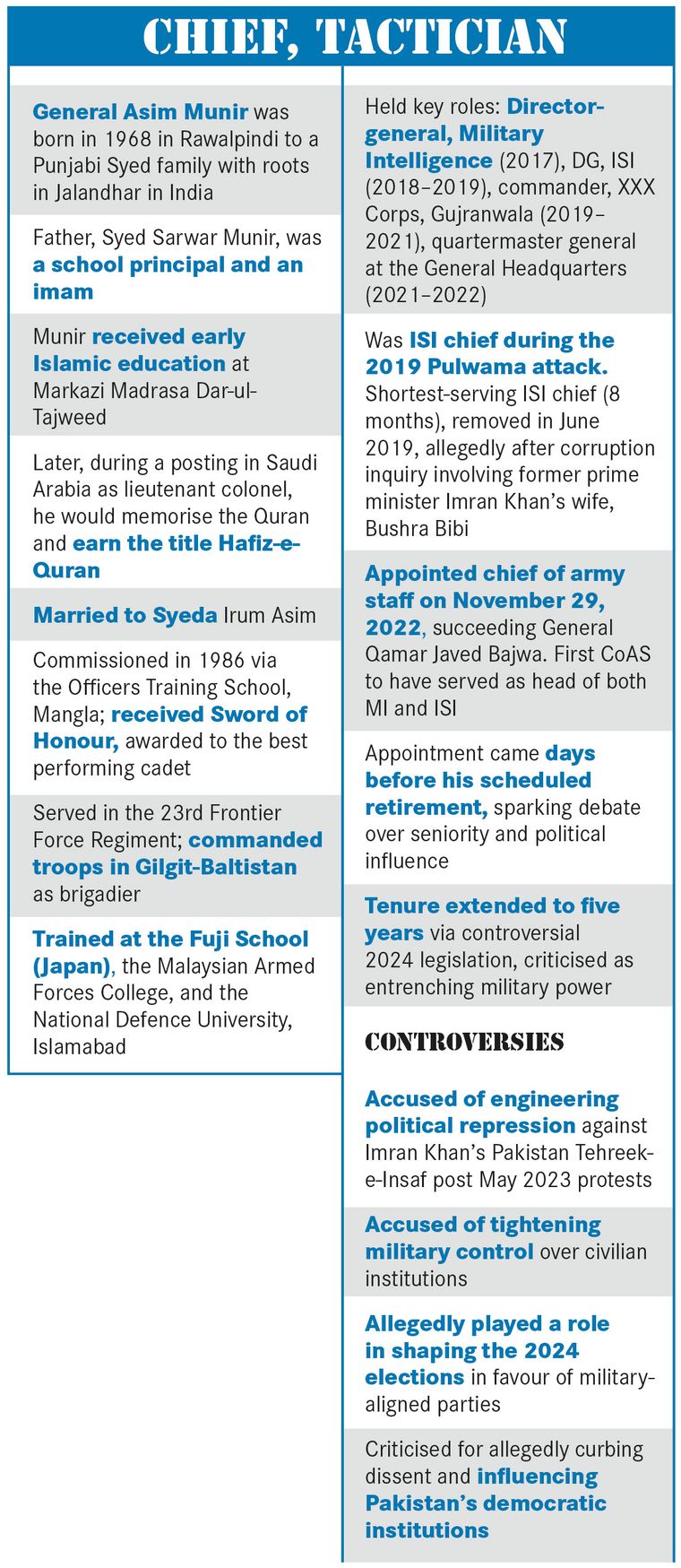IN PAKISTAN, the army chief continues to wield perpetual power. General Asim Munir, the incumbent, was earlier removed by Imran Khan from his post as director general of the Inter-Services Intelligence. His appointment followed months of speculation, controversy and behind-the-scenes lobbying.
Munir’s leadership is deeply flawed. He has undermined the civilian government and pushed the country closer to economic collapse and a near-civil war scenario west of the Indus river. His poor handling of the security of the China-Pakistan Economic Corridor (CPEC) has alarmed China, leading Beijing to halt new projects. Pakistan is now dealing with a long list of challenges, including political instability, democratic backsliding and worsening internal security.
Munir’s tenure has exposed growing internal tensions and leadership failures within the Pakistan army. Last year was particularly grim: 579 civilians were killed in 784 terror attacks―the highest toll since 2015; 383 security personnel, too, lost their lives.
Insurgency west of the Indus has worsened, with no effective response. The army has failed to devise a strategy to counter the Tehrik-i-Taliban Pakistan (TTP) and has made no progress in persuading Afghanistan to rein in the group. The Baloch Liberation Army (BLA) has grown more aggressive. Last August, the BLA executed 23 workers from Punjab after checking their identity cards. In November, it carried out a suicide bombing at Quetta railway station, killing 26. In October, the killing of two Chinese nationals near Karachi airport drew a sharp response from Beijing, which labelled the security situation “unacceptable” and a “constraint” on the CPEC.
The most chilling episode during Munir’s tenure occurred on March 11 when BLA militants hijacked the Jaffar Express from Quetta to Peshawar―carrying 440 passengers―near a tunnel 160 kilometres from Quetta. They segregated non-Baloch passengers and four paramilitary personnel and executed them.
Unrest has also spread in Pakistan-occupied Kashmir (PoK) and Gilgit-Baltistan. In Gilgit-Baltistan, people have protested against political disenfranchisement, demographic manipulation, sectarian violence, economic exploitation and cultural suppression. Many are now openly demanding reunification with India, frustrated by decades of Pakistani neglect. In PoK, demonstrations have broken out in several areas against Islamabad’s systematic looting of local resources.
Pakistan’s democratic decline has worsened under Munir. The general elections of February 2024 were widely regarded as rigged. Held after months of unconstitutional delays, the elections excluded the Pakistan Tehreek-e-Insaf (PTI)―the country’s most popular party―from campaigning freely. PTI leader, Imran Khan, was jailed, and the party was forced to contest without its electoral symbol. The political crisis that began nearly three years ago with Khan’s ouster continues to fester, making Pakistan’s political culture increasingly toxic and divided.

Munir has become the most unpopular army chief in Pakistan’s recent history. Public trust in the military has plummeted. Dissent within the ranks has grown louder. Three corps commanders were forced to resign, a former ISI chief is behind bars and 15 top officers were disciplined following the attack on the Lahore corps commander’s residence. Reports suggest that Munir ordered the premature retirement of numerous senior and mid-level officers. A group of junior officers even wrote to him, urging his resignation.
On April 16, Munir made a provocative statement in a bid to rally nationalist sentiment and deflect internal pressure, declaring Kashmir to be Pakistan’s “jugular vein”. He also urged Pakistanis to remind their children that they were “different from Hindus”, elaborating on the two-nation theory. He stressed on the differences in religion, customs, traditions, thoughts and aspirations. The speech appeared to be a desperate attempt by Munir to salvage his image by shifting blame to India. With obvious directions from the ISI, terrorists carried out a brutal attack on April 22 in Pahalgam. The perpetrators targeted innocent tourists, selecting victims based on their religion. Unable to address failures on foreign, economic and military fronts, Munir resorted to the age-old tactic of raising tensions with India, but this time, he gravely misjudged the Indian resolve.
Arguably, the biggest failure of Munir’s leadership is his inability to reform or restore confidence in the Pakistan army. Once regarded as a professional force and the nation’s saviour, the army now finds itself at the centre of political, economic and institutional collapse. Following the Pahalgam attack and amid fears of an Indian counterstrike, the military experienced an unprecedented wave of resignations. In just two days, nearly 5,000 officers and soldiers reportedly quit, sending shock waves through the institution. Lieutenant General Umar Bukhari, commander of the 11 Corps, reportedly warned Munir that morale was crumbling and that if the resignations continued, the army would be unable to mount a credible defence in a conflict with India.
An air of fear and uncertainty hangs heavily over the Pakistani military as it struggles to maintain cohesion amid growing external and internal pressures. Munir’s personal credibility is at rock bottom, with his orchestration of the terrorist violence in Pahalgam adding to the woes,
―The author is General Bipin Rawat chair of excellence at the United Service Institution of India and distinguished fellow, Centre for Land Warfare Studies and Vivekananda International Foundation.



